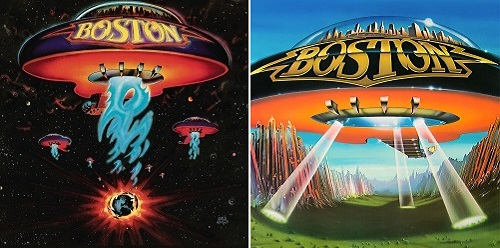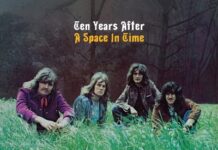Nineteen seventy-six was a transitional year in rock and roll. The limit had pretty much reached the sky with bands like Yes and ELP. Roots music in the form of punk was gearing up to bring things down to earth. But before that would happen, Kiss, Aerosmith, Blue Oyster Cult and ZZ Top would pump out highly accessible radio fodder and tear it up on the road. Then Boston came along and added a new dimension to the whole corporate swing: a sound assembled like parts of a great machine. Masterminded by MIT graduate Tom Scholz, Boston was a product of a mechanical engineer who spent his spare time away from Polaroid conducting sonic experiments in his basement with a 12-track recording console, his own melodic ideas, and an arsenal of high-tech toys. Thirty years later, the unyielding results of those experiments — the debut, self-titled Boston and its follow-up Don’t Look Back — have been reissued with extensive liner notes and a sound as striking and alive today as it was in the 70s.
The debut Boston, over 17 million in sales to date, was a quagmire in the quake of a burgeoning music revolution. The punks would just have to wait their turn because Middle America loved Boston and their brand of melodic, sweet sounding rock. Their songs were simple and unpretentious with a soothing, yet thunderous underbelly. “More Than A Feeling” and “Peace Of Mind” are no fuss rocker/borderline ballads that almost define the forthcoming genre (egad!). “Smokin” and “Rock & Roll Band” are in-your-face blazers without an unpleasant aftertaste. At the center of it all is the epic, “Foreplay/Long Time” — one tune that truly exhibits the musicianship of this group of veteran Beantown players.
Two years later, Don’t Look Back came rolling along to capitalize on the first album’s unparalleled success. Sophomore releases are typically difficult obstacles to overcome, especially when your first album breaks sales records. Expectations were running exceedingly high, but Scholz rose to the challenge without allowing the pressure to affect his acute work ethic. This enabled the album’s hook-filled anthems to extend the Boston concept further without alienating the growing fan-base. The title track explodes into a fiery expression as “The Journey” bridges the tension before returning to familiar territory for “It’s Easy.” Reaching beyond the shenanigans of the debut, the group dug in deeper with “A Man I’ll Never Be,” a majestic ballad before surrendering to the inevitable: the positively upbeat “Party.”
Ironically, the party was over for another eight years. When the group finally reconvened for Third Stage, the sound was faintly reminiscent, but aside from Scholz and singer Brad Delp, the other players had come and gone. As depicted on the cover of the debut album, Boston was like a massive spaceship on a mission to perpetuate Scholtz’ ideas with Delp’s siren-fueled vocals leading the way. Occasional resurfacings have yet to reveal any major improvements to the grand invasion of the late 70s. But let’s face it: a combined sale of 25 million records can go an awfully long way.
~ Shawn Perry




















